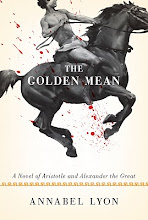Historical fiction has lately devolved into genre fiction, featuring predictable stories (usually of forbidden love) and affording readers the opportunity for moral outrage at a safe historical distance. It's fun and easy--but not especially challenging or intellectually engaging--to feel yourself on the right side of issues like misogyny, racism, classism, gay rights, etc.
As James Wood wrote in a recent New Yorker review, "Sometimes, the soft literary citizens of liberal democracy long for prohibition. Coming up with anything to write about can be difficult when you are allowed to write about anything. A day in which the most arduous choice has been between "grande" and "tall" does not conduce to literary strenuousness."
The historical fiction I enjoy tends to subvert or ignore the tropes of the genre. Here are three novels about the ancient world that subvert, surprise, challenge, and please.
David Malouf's An Imaginary Life (1978). The Roman poet Ovid is exiled to a barbarian village at the edge of the Black Sea, where he ends up caring for a feral child. Most historical fiction tries to impress the reader with the sophistication of the period it recreates (for some reason my mind jumps here to Gwyneth Paltrow's toothbrush thingy in Shakespeare in Love). Malouf, in contrast, portrays the absolute fear and dread of the 'civilized' mind (represented by Ovid) in the face of the truly primitive. The author powerfully conveys the sheer otherness of the ancient world.
Grant Buday's Fireflies (2008). A prose retelling of the Iliad from Odysseus' point of view. The great strength of Buday's novel isn't in any formal innovation or revisionism. Rather, it's the crispness and humour and beauty of the prose that make this book worth seeking out.
Mary Renault's Fire From Heaven (1969). The first twenty years of Alexander the Great's life, including his time with Aristotle, from the boy's own point of view. This novel is the first of a trilogy about the life of Alexander. I avoided reading this one for a long time because it dealt with many of the events I was writing about, and I didn't want to have my conception of events influenced by another fiction writer. When I finally finished my own novel and allowed myself to read Renault, I was relieved I hadn't read her sooner, because I would have been completely psyched out: the writing is excellent, the research immaculate, the characters psychologically profound. I particularly appreciated her no-nonsense portrayal of Alexander's bisexuality. A lesser author would have made this the focus of the novel, but Renault is cool enough not to let the hot stuff derail her larger narrative.
If you're wondering when I'm going to get around to Robert Graves, the answer is in a future post about TV and film, since I was introduced to his work through the great 1976 BBC adaptation of his novels I, Claudius and Claudius the God. Stay tuned!
Subscribe to:
Post Comments (Atom)

No comments:
Post a Comment